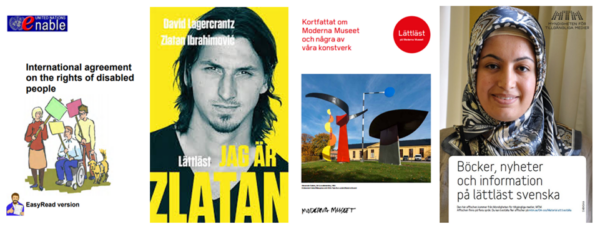Newspapers, books and football stars
Making the built environment accessible has almost become a matter of course. When dealing with information and language, however, we still have a long way to go: Probably most of us have struggled with the complex jargon of public authorities. But also newspapers, books or texts in a museum exhibition can pose a challenge for persons with intellectual disabilities (ID), illiteracy, dementia or little language skills. A tool intended to facilitate participation in society and to realize what the UNESCO calls a fundamental ‘right to know’ is the concept of easy-to-read, a simplifying language with short sentences, easy vocabulary and large typeface. Despite its potentials, however, easy-to-read divides opinions: There are not a few who criticize the concept for ruining linguistic beauty and for being overly paternalistic.
I was therefore surprised how frequently I crossed paths with the Swedish version of easy-to-read, lättläst, during an archival research trip to Stockholm – on websites, in a bookstore that dedicated a whole shelf to lättläst literature, among others advertising the biography of football star Zlatan Ibrahimović, and even in the dusty boxes of the archives. I began to look for more examples of easy-to-read in Swedish disability history, realizing that evidence of it dated as far back as the 1960s. As most literature accredits the origins of easy-to-read to British and American self-advocacy groups of the 1990s, like the People First Movement, my curiosity was piqued.
What are the origins of lättläst, and what can this history tell us about persons with ID in the Swedish society – long before the concept started to take hold internationally?

From left to right: UN Convention on the Rights of Persons with Disabilities; David Lagercrantz/Zlatan Ibrahimović: Jag är Zlatan; museum guide of Moderna Museet; Swedish Agency for Accessible Media
Outsiders in the welfare state
The very first lättläst book was published in 1968 – not by a disability organization, but the Swedish National Board for Education. Instead of creating a completely new book, the choice fell on Per Anders Fogelström’s popular novel Sommaren med Monika (Summer with Monika, probably most (in)famous for Ingmar Bergman’s salacious film adaption). The time of release was no coincidence: This was the time of the ‘Swedish miracle’ with economic prosperity and a generous welfare system built upon values like equality, solidarity and social justice. But while society as a whole was thriving, it became obvious that not everyone benefitted equally from this development – particularly those who were not in work, as was often the case for persons with disabilities.
Why, then, was it a governmental institution and not a grassroots initiative that made the production of lättläst literature its mission? To answer this question, we have to delve deeper into the historical situation of persons with disabilities in Sweden. Since 1956, Swedish disability policies were part of the Social Benefits Act that depicted persons with disabilities less as citizens with equal rights than in need of assistance. For persons with ID, segregating accommodation in large care institutions was the norm; an instrument of social control, for which the state assumed primary responsibility. Their living situations stood in stark contrast to the progressive image of the universal welfare state, an issue that parents and the press questioned and investigated, with reverberating effects: Around 1960, a whole wave of critical media coverage about the social neglect of persons with ID led to heated discussions throughout the Nordic countries and forced policymakers to rethink their stance.
Self-advocacy “in the backyard of the People’s Home”
A leading actor was the Swedish Parents’ Association for Mentally Retarded Children, an organization that worked towards better living conditions in the institutions, tried to reshape public opinion and organized integrative workshops or leisure activities. But life in the institutions also changed from within, as young people with ID began to organize their own clubs and meetings. By doing so, they emancipated themselves from the well-intentioned, but often patronizing events prepared by their parents and the personnel in institutional care. No less importantly, these initiatives also challenged the very basis on which politicians justified segregation of persons with ID in special institutions in the first place – by showing that they could, and would, represent their own interests. This tied directly into the debates that were already in full swing at the political level.
In the discussion on how equal rights could be realized for persons with ID, communication and language crystallized as crucial points: to know one’s own rights, to form opinions and make informed decisions. The state could no longer ignore this large group living, as the disability activist Vilhelm Ekensteen put it, “in the backyard of the People’s Home”.
***
Part II of this blog will continue to trace the history of persons with ID in the Swedish state and explores how the concept of lättläst has been used as a tool for broadening their circle of social belonging.